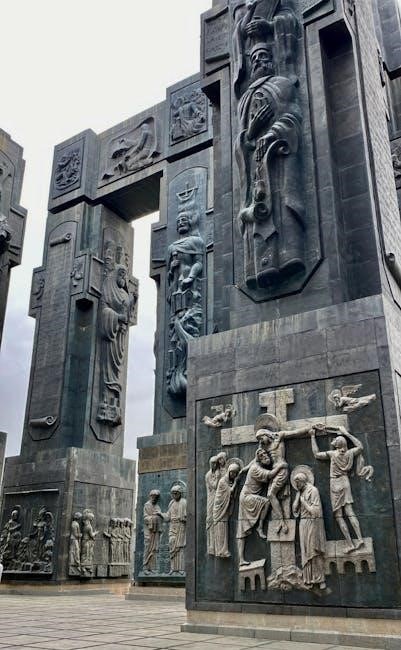The Georgia Procurement Manual (GPM) serves as the official guide for state procurement processes‚ ensuring transparency and compliance with Georgia statutes․ It outlines policies‚ procedures‚ and ethical standards for procuring goods‚ services‚ and contracts‚ fostering fairness and accountability in public spending․
Overview of the Georgia Procurement Manual (GPM)
The Georgia Procurement Manual (GPM) is a comprehensive guide outlining the state’s procurement policies‚ procedures‚ and regulations․ It is designed to ensure transparency‚ fairness‚ and compliance in public procurement processes․ The manual is regularly updated to reflect best practices and legal requirements‚ serving as a primary resource for state agencies‚ procurement officials‚ and suppliers․ It covers topics such as purchasing rules‚ ethical standards‚ and compliance measures‚ providing a framework for efficient and accountable public spending․ The GPM is accessible online‚ making it easily available to all stakeholders involved in state procurement activities․
Purpose and Scope of the GPM
The Georgia Procurement Manual (GPM) is designed to standardize procurement practices across state agencies‚ ensuring consistency and compliance with legal requirements․ Its primary purpose is to provide clear guidelines for procuring goods‚ services‚ and construction in a fair and transparent manner․ The manual’s scope includes defining purchasing rules‚ ethical standards‚ and accountability measures‚ while also offering resources for suppliers and procurement officials․ It aims to promote efficient use of public funds and maintain public trust by ensuring that all procurement activities align with state statutes and best practices․
Procurement Policies and Procedures
The Georgia Procurement Manual outlines policies and procedures to ensure ethical‚ transparent‚ and efficient public procurement processes‚ establishing guidelines for purchasing decisions and accountability․
General Provisions and Purchasing Rules
The Georgia Procurement Manual establishes general provisions and purchasing rules to ensure fair competition‚ transparency‚ and accountability in state procurement․ These rules govern the acquisition of goods‚ services‚ and construction‚ outlining ethical standards and compliance requirements․ Purchasing decisions must adhere to Georgia statutes‚ promoting integrity and public trust․ Suppliers are expected to comply with all applicable regulations‚ ensuring timely and cost-effective delivery of quality products․ The manual also provides guidelines for contract management‚ bid protests‚ and dispute resolution‚ fostering a fair and competitive environment for all stakeholders․ These provisions aim to maximize value for public funds while maintaining legal and ethical procurement practices statewide․
Authority and Compliance with Georgia Statutes
The Georgia Procurement Manual (GPM) operates under the authority of Georgia state laws and regulations‚ ensuring all procurement activities align with statutory requirements․ Compliance with these statutes is mandatory for all state agencies‚ promoting ethical and lawful procurement practices․ The GPM incorporates specific legal references‚ guiding procurement professionals to adhere to rules and avoid conflicts of interest․ Agencies must follow established procedures to ensure transparency and accountability in public spending․ Failure to comply may result in legal penalties or procedural setbacks․ The manual emphasizes the importance of understanding and applying Georgia statutes to maintain integrity in the procurement process․

Supplier Guidelines and Registration
The Georgia Procurement Manual provides guidelines for suppliers seeking to do business with the state‚ outlining registration and certification processes to ensure compliance and fairness․
How to Do Business with the State of Georgia
Doing business with the State of Georgia involves understanding the procurement processes outlined in the Georgia Procurement Manual (GPM)․ Suppliers must register through the state’s procurement system to access bidding opportunities․ Certification programs‚ such as minority- or women-owned business certifications‚ can enhance visibility․ The GPM provides detailed guidelines on responding to solicitations‚ submitting bids‚ and adhering to ethical standards․ Suppliers are encouraged to review the GPM for compliance requirements and to stay informed about upcoming procurements․ Transparency and accountability are emphasized throughout the process to ensure fair competition and public trust in state procurement activities․
Supplier Registration and Certification Processes
Suppliers seeking to do business with the State of Georgia must register through the state’s procurement system․ Registration typically involves providing detailed company information and agreeing to comply with state procurement rules․ Certification programs‚ such as Minority Business Enterprise (MBE) or Women-Owned Business (WBE) certifications‚ are available to enhance supplier visibility․ These certifications require documentation and verification but offer preferential consideration in the procurement process․ The Georgia Procurement Manual (GPM) outlines the steps for registration and certification‚ ensuring a streamlined and equitable process․ Suppliers are encouraged to review the GPM for specific requirements and updates to maintain compliance and eligibility for state contracts․

Procurement Methods and Processes
The Georgia Procurement Manual outlines methods like competitive bidding‚ RFPs‚ and piggybacking to ensure fair and transparent procurement processes‚ promoting accountability and ethical practices in state purchasing․
Competitive Bidding and Solicitation Processes
Competitive bidding and solicitation processes are central to the Georgia Procurement Manual‚ ensuring fair and transparent procurement․ These processes include Requests for Proposals (RFPs)‚ Invitations to Bid (ITBs)‚ and Requests for Qualifications (RFQs)․ They are designed to promote competition‚ achieve cost-effectiveness‚ and ensure the best value for public funds․ Solicitations are publicly advertised to maximize participation‚ and responses are evaluated based on predefined criteria․ The GPM emphasizes compliance with state statutes and ethical standards throughout these processes‚ fostering accountability and public trust․ Proper documentation and adherence to timelines are critical to maintaining the integrity of competitive bidding and solicitation in Georgia․
Types of Contracts and Agreement Structures
The Georgia Procurement Manual outlines various contract types and agreement structures to facilitate effective procurement․ These include fixed-price contracts‚ cost-reimbursement contracts‚ and term contracts‚ each tailored to specific procurement needs․ Fixed-price contracts are used for well-defined requirements‚ while cost-reimbursement contracts suit projects with uncertain scopes․ Term contracts enable repeated purchases of goods or services over a set period․ The GPM also covers agreements like memoranda of understanding (MOUs) and intergovernmental agreements‚ ensuring compliance with state regulations․ Properly structured contracts and agreements are essential for maintaining accountability‚ minimizing risks‚ and achieving procurement objectives efficiently․

Compliance and Ethical Considerations
Compliance and ethical considerations are crucial in Georgia procurement processes․ The GPM emphasizes adherence to ethical standards and legal requirements to ensure integrity and transparency‚ building trust with suppliers․
Ethical Standards in Public Procurement
Ethical standards in public procurement are essential to maintain integrity and fairness․ The Georgia Procurement Manual mandates that all procurement activities must adhere to strict ethical guidelines‚ ensuring impartiality and transparency․ These standards require procurement officials to avoid conflicts of interest‚ maintain confidentiality‚ and uphold professionalism․ The manual emphasizes the importance of ethical behavior in building trust with suppliers and the public․ By complying with these standards‚ Georgia ensures that public resources are used efficiently and effectively‚ fostering a culture of accountability and integrity in all procurement processes․
Transparency and Accountability Measures
Transparency and accountability are fundamental principles in Georgia’s procurement processes․ The Georgia Procurement Manual mandates open competition‚ public access to procurement documents‚ and clear communication with suppliers․ All procurement actions must be documented thoroughly‚ ensuring traceability and compliance with state statutes․ The manual also outlines oversight mechanisms‚ such as audits and reviews‚ to monitor adherence to ethical standards․ These measures ensure that public funds are utilized efficiently and that procurement decisions are made with integrity․ By maintaining transparency‚ Georgia builds trust with suppliers and the public‚ fostering a culture of accountability in all procurement activities․
Protest and Dispute Resolution Mechanisms
The Georgia Procurement Manual establishes clear procedures for filing protests and resolving disputes‚ ensuring fairness and oversight in procurement processes‚ with detailed guidelines for documentation and resolution․
Procedures for Filing a Procurement Protest
The Georgia Procurement Manual outlines detailed procedures for filing a procurement protest‚ ensuring transparency and fairness․ Protesters must submit written objections to the Chief Procurement Officer within specific deadlines‚ typically five business days after the procurement decision․ The protest must include clear grounds‚ such as allegations of irregularities or violations of procurement laws․ The protester must also provide relevant documentation supporting their claims․ The agency will review the protest and issue a written decision‚ which may be appealed further if necessary․ These procedures ensure accountability and provide a structured pathway for resolving procurement-related disputes․

Resolution Processes for Disputes
The Georgia Procurement Manual establishes clear resolution processes for disputes arising from procurement activities․ Disputes are typically addressed through formal protests‚ which must be submitted in writing to the Chief Procurement Officer․ The protest must detail the grounds for the dispute and provide supporting evidence․ The agency will review the protest and issue a written determination․ If unresolved‚ parties may pursue further appeal or arbitration‚ depending on the nature of the dispute․ These processes ensure that conflicts are addressed fairly and efficiently‚ maintaining the integrity of the procurement system while protecting the rights of all parties involved․
The Georgia Procurement Manual is a comprehensive resource guiding state entities through procurement processes‚ ensuring compliance with laws and ethical standards․ It fosters transparency‚ accountability‚ and fair competition‚ crucial for effective public spending․ By adhering to the GPM‚ stakeholders maintain integrity in procurement‚ supporting Georgia’s economic growth and sustainable development․
